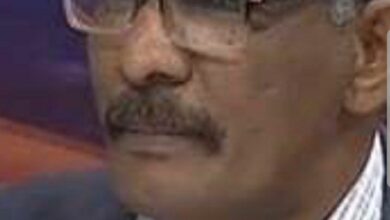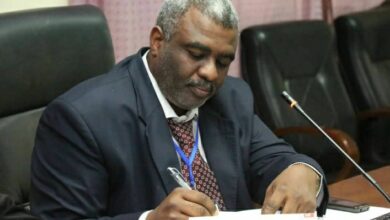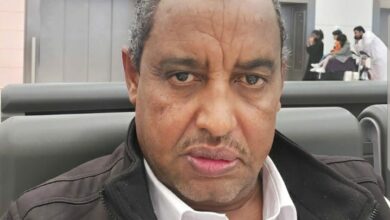
General Abdel Fattah al-Burhan’s Speech at the 79th Session of the United Nations General Assembly
By/Osama Abdel Majid
1.
Key Message to the International Community:
In his address to the 79th session of the United Nations General Assembly, General al-Burhan conveyed a significant message to the international community, highlighting the growing threats to international peace and security. He expressed support for initiatives aimed at reforming UN bodies, particularly the Security Council. Additionally, he acknowledged the theme of this year’s session—”Unity in Diversity for Peace, Sustainable Development, and Human Dignity.”
2/Implied Criticism of the United States
Al-Burhan subtly criticized the United States, referring to increasing unilateral actions outside the UN framework. He condemned the use of coercive measures to achieve political goals, which he argued contribute to destabilizing global security, politics, and economics, and fuel wars.
3/A Concise Description of the War in Sudan
The general described the war briefly but accurately, stating it was initiated by a group rebelling against the state with local and regional political and logistical support. He outlined the stages of the conflict, saying it began as an attempt to seize power by force and quickly escalated into a full-scale war against the Sudanese people and their nation.
4\Calls for Classifying Militias as Terrorist Groups
Al-Burhan emphasized the need to classify the militias as terrorist groups, citing their crimes, which he claimed were backed by regional states supplying them with money and mercenaries. He repeatedly questioned why the international community had not taken decisive action against these militias and their backers. He reminded the audience that these militias had attacked diplomatic missions, the UN, and other organizations, and were defying international laws by rejecting the Jeddah agreement and UN Security Council resolutions, particularly the arms embargo on Darfur.
5/Positive Role of the Government and Military
He highlighted the positive role of the government and the army, pointing to how citizens flee areas controlled by criminal groups and seek refuge in government-controlled areas. He noted the government’s early efforts to find solutions, including the Jeddah Declaration in May 2023, and its actions to open borders and airports to alleviate citizens’ suffering and facilitate the delivery of humanitarian aid. He affirmed the government’s commitment to international law, particularly in protecting civilians.
6/Five Conditions for Accepting any Initiative to Stop the War
Al-Burhan outlined five conditions for accepting any initiative to end the war:
- No involvement of any state or organization that supported the war or contributed to the killing or displacement of Sudanese, whether by providing arms or political support.
- Preservation of the dignity of the Sudanese people.
- Maintenance of national sovereignty.
- A guarantee that the war will not resume.
- Accountability for war crimes, ensuring no impunity.
7/
Six Conditions for Halting the Fighting
He further elaborated on six conditions to cease hostilities:
- The withdrawal of the rebel militias from occupied areas and the return of displaced people.
- Concentration of the militias in specific areas.
- Disarmament to allow citizens to return home and facilitate aid distribution.
- Opening of roads and airports to restore normal economic activity.
- Following these steps, launching a comprehensive political process to restore the democratic transition.
- Implementing sustainable solutions led by Sudanese to prevent future wars and military coups. 8/ Defending the Sudanese Armed Forces
He strongly defended the Sudanese Armed Forces, highlighting four key points: - It is one of the country’s oldest institutions, operating with complete professionalism.
- It is not beholden to any political entity.
- It is committed to the democratic transition and the people’s right to choose their leaders.
- It remains dedicated to transferring power to any consensual or elected government.
9/Tough Stance Against Islamists
Al-Burhan took a hardline stance against Islamists, stating that the military would not allow the return of the previous regime, which he claimed had been rejected by the people. While the return of any political force should be determined by the people, not the army, this could be seen as an attempt to reassure the West or gain favor with civilian political groups, distancing himself from accusations of ties to Islamists, despite their support for the military in confronting the militias.
10/ Reassuring Darfur Movements
He reassured his allies from Darfur’s movements by reaffirming his commitment to completing the Juba Peace Agreement signed in 2020, a point he had made in previous speeches. However, this is complicated by the Eastern Sudan Agreement, led by Khaled Shawish, which faces opposition from the Beja High Council, a military ally, led by Nazir Turk. Al-Burhan also reiterated his willingness to seek peace with all groups still bearing arms, a positive signal.
11/ Praise for International Recognition of the Rebellion
Al-Burhan praised those who recognized the conflict as a rebellion against the Sudanese state, referencing countries, organizations, and human rights groups, as well as the resolutions of the Manama and Rwanda Lakes summits and the OIC meeting in Yaoundé. He issued a strong warning, urging the UN to label the militia as a terrorist group for its crimes, which he argued meet the criteria for such classification.
12/
Reaffirming Sudan’s Position on
Palestine
Al-Burhan reaffirmed Sudan’s unwavering stance on the Palestinian issue, supporting the Palestinian people’s right to establish an independent state and calling for an immediate end to the aggression on Gaza. He also recommended granting Palestine full membership in the UN and mentioned his earlier meeting with Turkish President Erdogan, where they discussed Israeli crimes.
13/Closing Remarks
In a smart conclusion, Al-Burhan reiterated his gratitude to those who supported the Sudanese people during their crisis and, after thanking the president and the assembly, he closed by saying, “The will of the Sudanese people will prevail.”
, September , 2024




